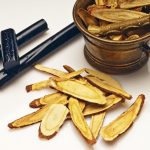Licorice is an effective breast cancer fighter, research reveals
 (NaturalHealth365) Licorice has been proven in numerous studies to stop cancer in its tracks, especially when it comes to breast cancer tumors. But this humble yet powerful herb has also gotten a bad rap for its association with heart arrhythmias, drops in potassium levels, and even heart attacks in some individuals.
(NaturalHealth365) Licorice has been proven in numerous studies to stop cancer in its tracks, especially when it comes to breast cancer tumors. But this humble yet powerful herb has also gotten a bad rap for its association with heart arrhythmias, drops in potassium levels, and even heart attacks in some individuals.
What is the real deal about licorice? Is it a healer or a health threat? Keep reading for the true facts that every cancer patient needs to know.
Licorice: Don’t overdo it, and stay away from the candy!
Let’s cut right to the chase and first talk about what all the fuss is about. The FDA and others warn that you can overdose on too much licorice – and for some individuals, this is absolutely true. According to the FDA:
“…black licorice contains the compound glycyrrhizin, which is the sweetening compound derived from licorice root. Glycyrrhizin can cause potassium levels in the body to fall. When that happens, some people experience abnormal heart rhythms, as well as high blood pressure, edema (swelling), lethargy, and congestive heart failure.”
Researchers at the University of Massachusetts add that too much licorice may have an effect on adrenal hormones and can lead to a condition called pseudoaldosteronism.
For these reasons, most experts recommend that healthy individuals interested in using the vast healing power of licorice utilize deglycyrrhizinated licorice, or DGL, where the glycyrrhizin has been removed (although glycyrrhizin itself is considered to be one of the healing substances in the root). Many also recommend not using any licorice product or supplement for more than four weeks at a time. Of course, if you experience any of the symptoms mentioned above, stop using it right away.
Discover a Simple and Effective Way to Remove Toxins: This is Jonathan's #1 choice for at-home detoxification. Special offer ends Feb. 16.
I would add that if you are on any kind of cancer-healing protocol, stay away from the candy version. This is not a healthy way to utilize the healing effects of this powerful herb. The “candy” version often contains more sugar than the actual herbal extract, and science has confirmed that cancer feeds on sugar. In addition, many commercially processed licorice candies are created using ammonium chloride.
Although no tests have been done as yet to determine this chemical’s carcinogenic effects, the U.S. Centers for Disease Control have found that chronic exposure to ammonium chloride can lead to acute respiratory problems.
What are the powerful cancer-killing properties?
Interestingly, the University of Massachusetts researchers and others in Western medicine recommend that individuals with hormone-sensitive cancers (such as breast, ovarian, uterine, and prostate cancer) avoid using licorice altogether.
However, this advice is in direct contrast to recent studies that have found specific tumor-reducing, immune-boosting, and hormone-regulating factors within the root.
Researchers at the University Sains School of Medical Sciences in Kelantan, Malaysia, discovered eight different bioactive immunomodulators within herbs such as licorice, curcumin, apricot, ginseng, and a host of others. Of these eight, four of them can be found in licorice, including:
- Ajoene, an anti-fungal
- Arctigenin, a lignan with anti-cancer effects
- β-carotene, a powerful anti-oxidant; and
- Glabridin acid can also prevents DNA damage caused by oxidation.
Other studies have found similar connections between the properties of licorice and breast cancer healing and prevention:
- Researchers at Rutgers University were able to isolate a particular polyphenol molecule, ß-hydroxy-DHP (BHP), extracted from licorice root. This molecule has the ability to kill breast and prostate cancer tumor cells while leaving healthy cells unaffected.
- The Chinese have long used licorice root as a hormone balancer and for complications associated with menopause. A study conducted by Nanjing Medical University in Nanjing, China, looked specifically at the Dimethyl Sulfoxide (DMSO) content found in licorice root and its effect on estrogen-positive breast cancer. The researchers found that licorice extract had an effect on estrogen levels that was breast cancer-preventative in a dose-dependent manner: the DMSO stunted cancer cell proliferation in high doses yet had the opposite effect at low doses.
- Other studies have found that licorice root helps to positively balance testosterone metabolism, decrease serotonin re-uptake, and reduce cortisol levels, all three of which are important to breast cancer prevention and healing.
- Finally, licorice has proven to be a powerful immune system regulator. Isoliquiritigenin and Naringenin found in the root can promote T cell growth. Glycyrrhizin and other flavonoids found in licorice can help reduce inflammation in the body overall.
Consider licorice as part of your breast cancer healing toolbox
There are so many powerful herbs found in nature that contain powerful cancer-healing properties. With over 400 compounds in one small root, licorice can definitely be considered among them. Ancient cultures from India to Greece knew this; licorice has been used all over the world for thousands of years as a hormone-balancer, immune system booster, aid for oral health, digestive aid, and more. Now, modern science is discovering the exact mechanisms that make it a true healer.
If you are considering using this herbal wonder as part of your breast cancer healing protocol, be sure to do so with the help of a qualified healthcare provider. In addition, certain tests, such as the Research Genetics Cancer Center (RGCC) Test, may be able to pinpoint if licorice supplementation is right for your breast cancer journey.
Editor’s note: Discover the best ways to stop cancer cell growth naturally, own the Stop Cancer Docu-Class created by NaturalHealth365 Programs.
Sources for this article include:
NIH.gov
Sciencedirect.com
Lifeextension.com
NIH.gov
NIH.gov
NIH.gov
NIH.gov
NIH.gov
NIH.gov
NIH.gov
Rgcc-group.com



